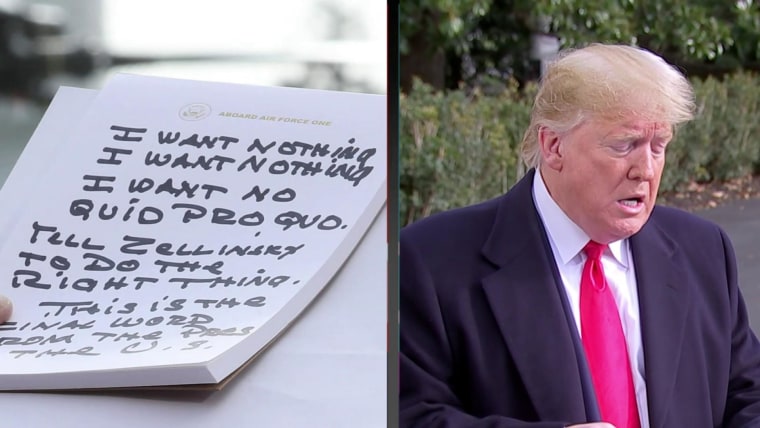On Aug. 12, a whistleblower filed a formal, written complaint with the inspector general for the intelligence community on Donald Trump's Ukraine scheme, roughly five weeks after the administration quietly froze U.S. military aid to the vulnerable ally. Inspector General Michael Atkinson soon after scrutinized the complaint, deemed it credible, and concluded that it involved a matter of "urgent concern."
As a procedural matter, the next step in the process was supposed to be notification of the Intelligence Committee chairs on Capitol Hill. But as it turns out, in this case, someone else was notified about the whistleblower's complaint, too. As the New York Times reported:
President Trump had already been briefed on a whistle-blower's complaint about his dealings with Ukraine when he unfroze military aid for the country in September, according to two people familiar with the matter.Lawyers from the White House counsel's office told Mr. Trump in late August about the complaint, explaining that they were trying to determine whether they were legally required to give it to Congress, the people said.
The timeline, of course, is of critical importance. Trump ordered the hold on military aid in July, he learned of the complaint against him in August, and he released the promised aid in September. Or put another way, the American president agreed to do the right thing only after becoming aware of the fact he'd been caught doing the wrong thing.
That's no small detail, especially in the context of an impeachment inquiry evaluating the motivations behind the White House scheme. Former federal prosecutor Mimi Rocah explained, "This is what prosecutors call 'consciousness of guilt.' It's very strong evidence that when he froze the money it was for an illicit purpose. Otherwise, why not keep it frozen and explain it was all on the up and up to fight 'corruption?'"
But let's also not overlook the testimony from Ambassador Gordon Sondland from last week.
Sondland told lawmakers about a conversation with the president in early September, in which Trump purportedly told the ambassador something to the effect of, "I want nothing. I want nothing. I want no quid pro quo. Tell [Ukrainian President Volodymyr] Zelensky to do the right thing."
Last week, Trump treated this as a major development, as if his clumsy message to Sondland was proof of his innocence. That didn't make any sense: the president can't credibly claim his own implausible cover story somehow exonerates him.
But in a smart piece this morning, the Washington Post's Greg Sargent explained why the latest revelations put last week's testimony in a new context.
[T]he "I want nothing -- no quid pro quo" defense now lies in ruins. Trump instructed Sondland to continue demanding Zelensky do his bidding -- at a time when Zelensky badly craved the very thing Trump controlled -- while preserving plausible deniability for any link between the two. We now know Trump had an overwhelmingly good reason for going out of his way to do this.Sondland read Trump's intentions correctly. If Sondland "presumed" the two were linked, Sondland was right to do so.This new piece of the puzzle also confirms yet again that we know perfectly well what happened here.
Is it any wonder the president and his lawyers are reluctant to participate in the House Judiciary Committee's impeachment proceedings? Given the evidence, what kind of defense could they realistically hope to present?
